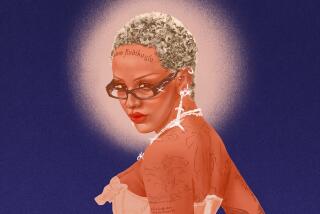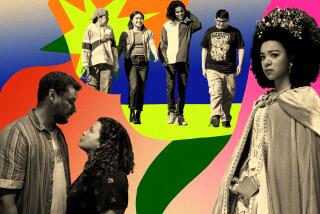Review: ‘Unsolved’ and ‘Atlanta’ dive into rap’s golden age and beyond
- Share via
The rap game, and hip-hop culture, are at the core of two cable series hitting airwaves this week — one a newcomer that arrived with little fanfare and the other a returning favorite with sky-high expectations.
USA Network’s scripted, true crime series “Unsolved: The Murders of Tupac and The Notorious B.I.G.,” is set around hip-hop’s golden age, the 1990s and early 2000s, when artists such as Lauryn Hill, Nas, and Jay-Z broke music and color barriers with game-changing albums. It looks at the demise of the genre’s top talent, young men both cut down before the age of 26. It’s a compelling and fresh look at two of the most famous cold cases in entertainment history.
For the record:
12:00 p.m. March 2, 2018An earlier version of this review identified Anthony Hamilton as creator of “Unsolved.” Hamilton is an executive producer, but Kyle Long is the series creator.
FX’s returning half-hour dramedy, “Atlanta,” which won top Emmy and Golden Globe honors for its first season, is set in the present-day. It follows three young-ish men trying to make it in an age of depleted music revenues and free streaming. The gold of hip-hop’s golden era has been melted down and pawned, essentially. Their half-realized aspirations and desperation make this second visit to “Atlanta” a painfully funny follow-up to a debut season that seemed hard to top.
Though far flung in terms of their approaches, both shows hit it out of the park in their respective genres, one a crime drama that explores how corruption, fear and racism thwarted the investigation into the highest-profile murders of a generation, the other a modern-day satire in which rejection, soft-goals and demoralizing day jobs are among the obstacles between artists — and their handlers — and fame.
“Unsolved” examines the Tupac and Biggie murders over ten episodes from two perspectives: that of LAPD detective Russell Poole (Jimmi Simpson from “Westworld”) who conducted the initial investigation into the murder of Biggie, and detective Greg Kading (Josh Duhamel), who was assigned to the cold case ten years later.
(Kading, who authored “Murder Rap: The Untold Story of Biggie Smalls & Tupac Shakur Murder Investigations,” is co-executive producer on the series along with executive producers Mark Taylor, Anthony Hemingway — who also directs — and creator Kyle Long.)
Tupac was the victim of a 1996 drive-by shooting on the crowded Vegas strip. Biggie died months later in a drive-by on the crowded streets surrounding the Petersen Automotive Museum. “Unsolved” challenges the conventional wisdom that both killings were acts of retribution sparked by the era’s East Coast-West Coast rap rivalry.
The series explores the involvement of the LAPD, the gangs the Crips and the Bloods and Death Row Records feared chief executive Suge Knight. One could argue Knight was more notorious than the Notorious B.I.G. when it came to his cutthroat business practices and penchant for payback.
Hemingway and crew clearly took great pains in recreating a Los Angeles where aging strip malls and parking lots stood before the pot dispensaries and luxury housing units “starting in the low $700,000s!”
The show also manages to permeate the layers upon layers of conspiracy theory, mythology and true crime intrigue that still envelops the unsolved crimes, with a painstaking recall of key events. With compassion and respect for the victims of these crimes, they explore what may have happened, and the results are intriguing, especially if you’ve followed the case over the decades.
As Poole, Simpson once again plays a convincing disillusioned do-gooder whose Boy Scout determination to make things right is at odds with the corrupt world around him. The talented Marcc Rose delivers a performance as Tupac that’s eerily close to the bone, while Wavyy Jonez has his work cut out for him as Biggie, an outsized character who still has never lived up to the charismatic heights of Tupac.
“Mr. Robot” aside, the USA Network is often upstaged by its flashier competitors who slay with dragons and superpowers. The network took a risk tackling a subject that’s been mined in countless documentaries (rap fans will recognize dialogue pulled verbatim from old interviews with the rappers). But with “Unsolved,” the gamble’s paid off as it promises to be a sleeper hit among giants.
“Atlanta” did not have the luxury of anonymity upon its return this week. It has a lot to live up to coming off the success of its 2016 debut on FX.
Created by Donald Glover, who also stars as Earn, the series turned the monotony and desolation of one’s finanicially strapped twenties and thirties into a sharp and understated comedy that’s as much about the black experience as it is about mining absurd corners of pop culture and millennialism.
Season two continues the meander into hilarity. In one scene, the broke and now homeless Earn, who is still managing the career of his cousin, rapper Paper Boi (Brian Tyree Henry), gets his client a meeting at a local social media company that can help promote him. But when they ask to hear Paper Boi’s music, their office technology is so advanced no one has the capacity to play a CD anymore. The meeting is spent calling in tech experts to convert a file from Earn’s phone.
Then during a contemplative moment at a gas station with Paper Boi’s sidekick Darius (the talented Lakeith Stanfield), Earn eats a bag of snacks and wonders aloud:
“What flavor is ‘Flaming Hot Cheeto?’”
“Hot,” answers Darius.
“Robbin’ Season,” the official subtitle of season two for the burglaries that are prevalent around the holidays when everyone is buying gifts, is loaded with the same brilliant mix of social commentary, internal dialogue and making something out of nothing.
“Christmas approaching, and everybody gotta eat,” says Darius. “Or be eaten,” adds Earn.
More to Read
The complete guide to home viewing
Get Screen Gab for everything about the TV shows and streaming movies everyone’s talking about.
You may occasionally receive promotional content from the Los Angeles Times.







